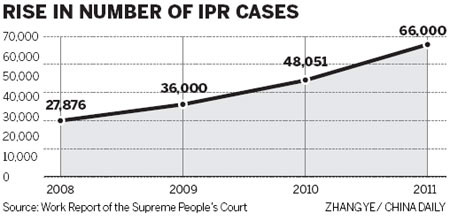Increasing IPR cases 'a result of awareness'
 0 Comment(s)
0 Comment(s) Print
Print E-mail China Daily, March 12, 2012
E-mail China Daily, March 12, 2012
The push for an innovation-based economy and growing public awareness has resulted in a soaring number of lawsuits involving intellectual property rights (IPR), the top court has said.

Last year saw 66,000 IPR cases go to litigation, up 37.7 percent over 2010, Chief Justice Wang Shengjun said on Sunday while presenting a work report on the top court to the national legislature.
The litigation jump is bigger than those for lawsuits in other categories.
The number of criminal cases last year rose 7.7 percent, to about 840,000. And the number of administrative cases was up by 5.1 percent to 136,000 last year, according to the work report.
"With rapid economic and social development in China, copyright lawsuits, involving complicated technical and legal problems, are soaring" the top court said in a statement issued after Wang made the report.
"Courts across the country are faced with the arduous task of protecting technical progress and innovation," the statement said.
A majority of last year's 66,000 concluded cases were related to disputes concerning ownership and infringement or contracts, according to a document from the top court's intellectual property tribunal.
The Guangdong Provincial High People's Court is still handling a high-profile trademark dispute between a Chinese company and Apple.
Proview Technology Shenzhen Co Ltd claims it owns the rights to the iPad trademark on the Chinese mainland. Apple refutes this.
The reason behind soaring IPR lawsuits is growing public awareness and China's vigorous push for science and cultural industries, legislators said.
"Because there were fewer legal disputes in the past that did not mean that IPR infringement did not exist," Zhu Jianmin, president of Liaoning Oxiranchem Inc, and a deputy to the National People's Congress (NPC), said.
"It's only because people were not fully aware of IPR importance or they didn't have laws to protect themselves then. The rise in IPR disputes will enhance the building of national brands and boost fair competition. Otherwise, a brand that takes a few years to build will soon attract a lot of copycats," he said.
Song Yushui, deputy president of Beijing's Haidian district court and also an NPC deputy, said that usually the sector with the most economic activity has the most demand for legislation.
"The rise of IPR lawsuits means that the knowledge-based economy is developing fast in China and has an increasing demand for legislation. Solving these IPR disputes will provide space for the knowledge economy to develop in a healthy, orderly way," she said.
However, the rise means that judges are facing an increasing number of challenges.
"IPR cases are different from traditional civil cases. They can be highly technical, and require a thorough understanding of relevant laws and regulations," the document from the intellectual property tribunal said.
As China is vigorously promoting the development of culture, courts across the country will pay special attention this year to IPR cases in the sector, including industrial design, Web productions, folk literature and arts. The courts will also take into account the intangible cultural heritage to promote the healthy development of the sector, the document said.





